By JAMES FIELDING, JOHN SIDDLE, DAVID PILDITCH, TOM BEDFORD, STEWART WHITTINGHAM AND ANDREW YOUNG
Mohamed Kamara stands by his single bed behind a small chest of drawers on which he has bags of sweets, fruit and a bottle of soft drink.
He lives in a modest terraced house a mile from the town centre in Nuneaton along with seven other young African men.
His bedroom, which resembles rudimentary university accommodation, is no bigger than 6ft by 8ft but the occupants – all strangers when they arrived – share a spacious modern kitchen, equipped with a double oven, stove and a microwave.
A black marble-effect table is positioned in the middle of the room in front of a black L-shaped sofa in the corner, above which are notices stuck to the wall advising residents in a variety of languages on what to do if their asylum application is successful.
The pebble-dashed property in the once thriving Warwickshire market town now beset with social problems has been Mohamed’s home for the last three months.
Mohamed, 20, arrived in Britain six months ago by small boat, travelling from his home in Guinea and heading via North Africa to Spain and then onto France, where he crossed the Channel in a dinghy.
If he had expected to have been housed in a hotel like thousands of other new arrivals, he was wrong.
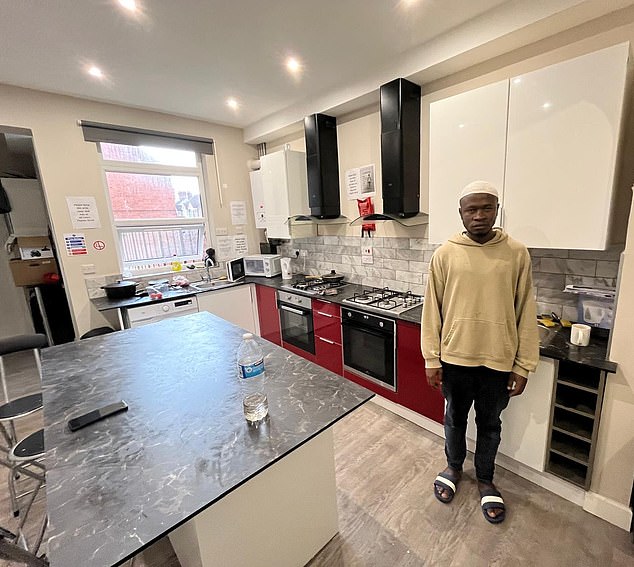
Mohamed Kamara stands in kitchen of his Home Office supplied terraced home in Nuneaton – one of thousands of asylum seekers being housed in private accommodation rather than hotel
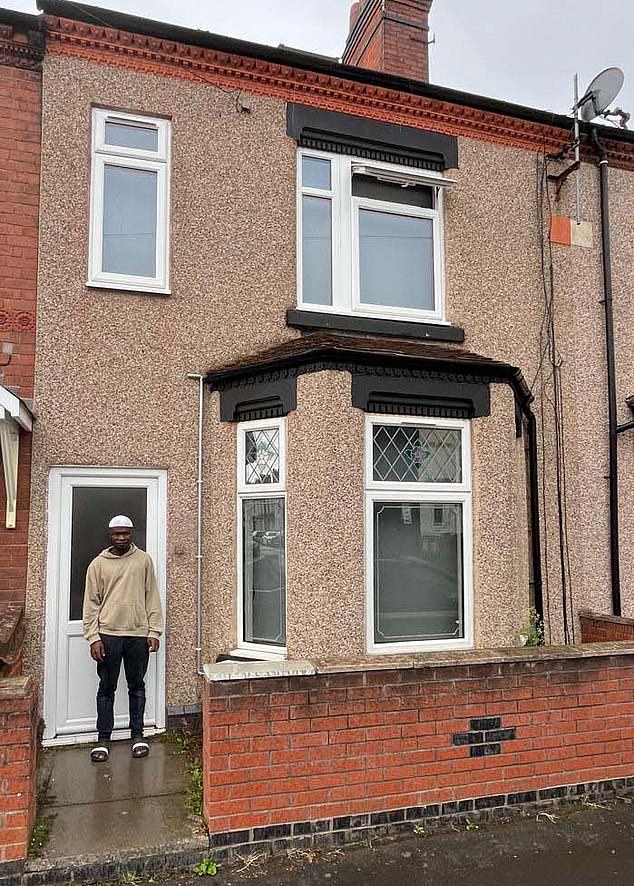
Mohamed shares the house with seven others – part of a secretive government bid, dubbed online ‘Operation Scatter’, to move thousands of asylum seekers across communities
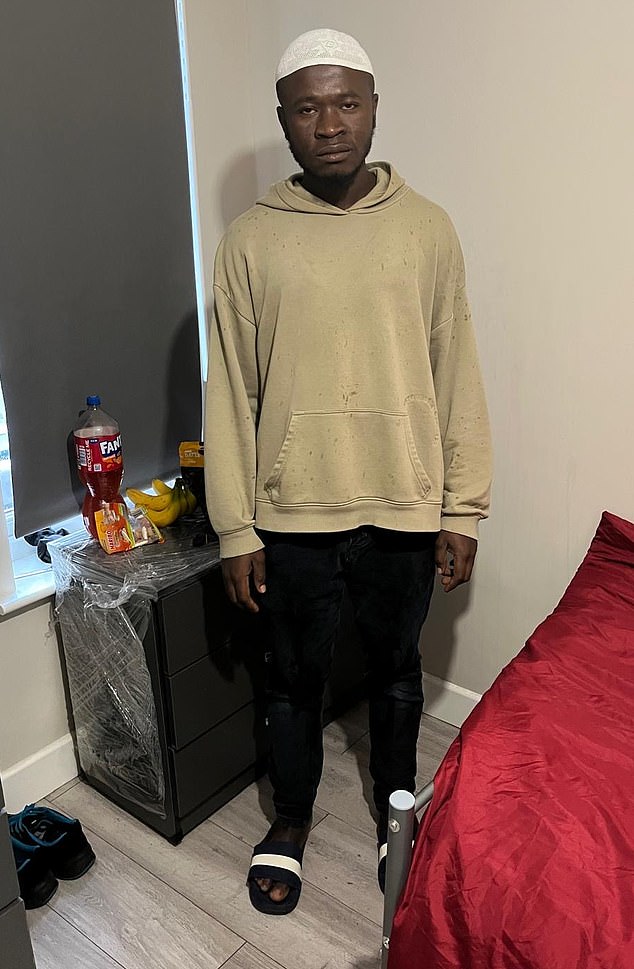
Mohamed – pictured in his bedroom – arrived by small boat from Guinea six months ago and is waiting for his application for asylum to be considered by the Home Office. Instead of being put up in a migrant hotel, Mohamed is being housed in private accommodation
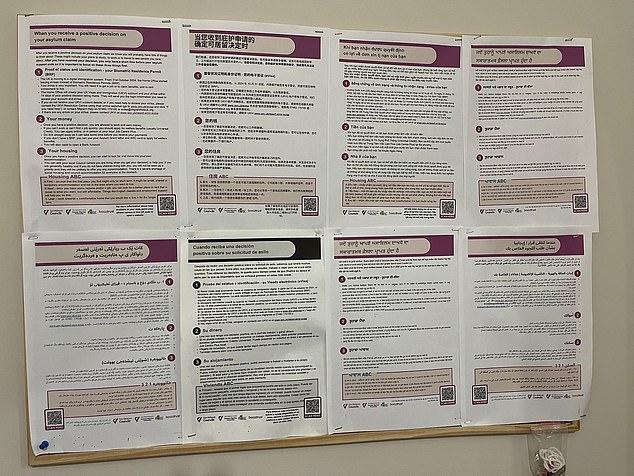
The government is switching policy of housing migrants in hotels and instead contracting the housing out to firms like Serco and private landlords. Inside Mohamed’s place is a notice on the wall advising residents in different of languages on what to do if their application is successful
For he is part of a secretive government operation to scatter thousands of asylum seekers across working-class communities, leafy suburban avenues, historic market towns and on smart private housing estates bought with taxpayers’ money.
It comes as more than 1,000 migrants arrived in the UK in small boats on Saturday – just as new Home Secretary Shabana Mahmood was ordered to ‘go up a gear’ to stop them.
It is the second-highest number of illegal migrants to enter the country this year in a 24-hour period. Ms Mahmood said it was ‘utterly unacceptable’, and is expected to order the transfer of migrants from hotels to army barracks. She will also consider changing human rights laws to make it easier to reject and deport asylum claimants.
Meanwhile, in the face of public backlash, over the thousands still in 200 migrant hotels, the Home Office has now switched strategy.
In what has been dubbed ‘Operation Scatter’ by social media critics, newcomers, including young foreign men under the age of 30, are being given homes on our streets instead.
Housing them in hotels, some luxurious enough for voters wanting to stay in them, has become a headache for the Home Office – and a lightening rod for trouble and ugly flashpoints.
And while dispersing them in private accommodation across Britain is logistically more problematic, they are less visible.
And the numbers speak for themselves. Because while asylum seekers have been arriving in the UK in record numbers – more than 111,000 so far this year alone – only 32,059 are being housed in hotels compared to 56,042 in September 2023.
Since that moment two years ago the change of Government policy dubbed ‘Operation Scatter’ by social media critics has seen more and more new arrivals discretely dispersed into properties owned by private landlords.
Figures uncovered by the Daily Mail show a number of towns and cities in the UK are now home to hundreds of asylum seekers – with not a single one living in a hotel.
Critics claim the policy has placed ‘an intolerable pressure on communities’ while taking ‘desperately needed homes away from local people’ – as well as forcing up rents across the board amid an ongoing housing shortage.
Our investigation comes amid reports that private landlords have been ordering families to leave their homes so they can sign lucrative deals to provide accommodation for asylum seekers.
Landlords are said to be scrambling to convert large family-sized houses into bedsits after striking up deals with the Government’s private contractors like Serco, Mears Group and Clearsprings Ready Homes.
The policy has left taxpayers funding the fabulously rich lifestyles of asylum tycoons like Clearsprings boss Graham King, the former caravan park boss who has amassed a personal fortune estimated at £1.015 billion.
In Nuneaton, fury erupted in July after the authorities were accused of trying to cover up the rape of a 12-year-old girl after two Afghan asylum seekers were charged over the attack.
Ahmad Mulakhil – who reportedly entered Britain by crossing the Channel – was charged with raping the schoolgirl while Mohammad Kabir has been accused of aiding and abetting rape, strangulation and kidnap.
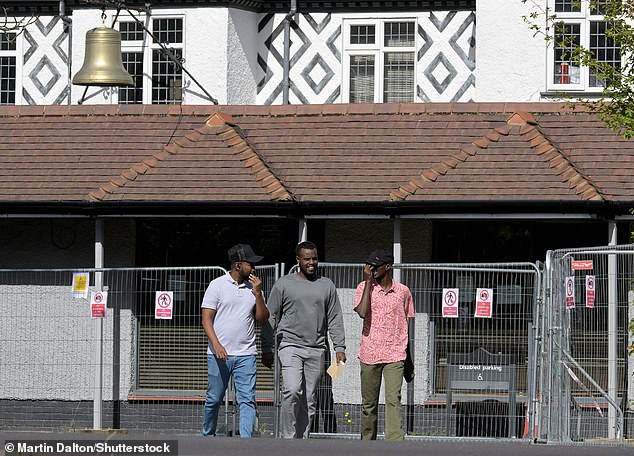
Migrant hotels like The Bell Hotel in Epping, have become a lightening rod for angry protests and flag waving rebellion. The Bell in particular came to the public’s attention when an Ethiopian asylum seeker, 41, was found guilty of sexually assaulting a 14-year-old schoolgirl

The incident prompted demonstrators to gather outside the town hall and call on the government to evict asylum seekers from The Bell Hotel. Scenes like these have prompted the government to alter its policy and try and house migrants in private houses
The pair denied the offences and have been remanded in custody awaiting trial on January 26 next year. Hundreds of residents, many clutching St George and Union flags, marched in protest to the town hall last month pleading for safety for ‘our girls’ after it emerged Warwickshire Police had advised local councillors and officials not to reveal the suspects’ origins.
The attack is said to have happened little more than 150 yards from the house where Mohamed lives and at least one of the suspects had links to the property.
Mohamed has no connection to the suspects and told how he only knows one other housemate – a fellow African from Eritrea.
After showing us around the terraced property that was rented to a family and turned into an HMO a year ago, he said: ‘We don’t socialise much, this is just where we cook and eat.
‘Three of us are from Africa and the other five are from Arab countries, I’m not sure where exactly.
‘I like living here, I prefer living in a house like this than in a hotel. The neighbours have been good to me, there have been no problems.
‘I won’t lie, I don’t do much all day but I like to go out for walks. I think Nuneaton is a nice town and I want to stay in England.’
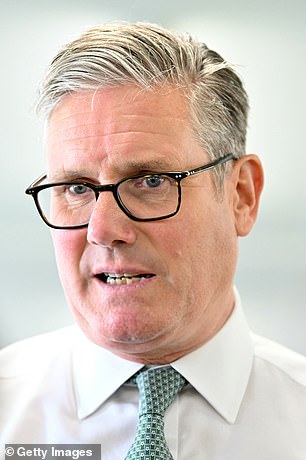
Sir Keir Starmer is struggling to get a grip on the UK’s migrant crisis
A few doors down lives Rosie Parsons, 30, who grew up on the street. She has a five-year-old daughter with her partner who was born in Jamaica and believes racism is rearing its ugly head more and more in Nuneaton.
‘There’s definitely a problem in this town and it’s become worse recently since the issue of asylum seekers became such a big focal point,’ she said.
‘You can feel the tension building up, particularly following the rape of the 12-year-old girl further up the road.
‘There’s been instances of big burly blokes – skinheads – turning up and asking people where the HMO is and where the asylum seekers are because they want some sort of revenge.
‘I’ve lived on this street all my life and I’ve noticed the changes, we used to have a strong community spirit but it’s gradually eroded.’
Rosie added: ‘My father passed away when I was younger and we had neighbours – many of whom were Muslim – coming round and asking if we needed anything and dropping off food parcels.
‘I’m not sure we’d get that today, what with more and more of the houses being converted into HMOs and people moving in who are only here temporarily.
‘I’ve had no problems personally with the HMO housing the asylum seekers. I’ve not seen any women living there, it’s just men and most of them keep to themselves.

Migrants wade into the sea to board a dinghy to cross the English Channel on August 25, 2025

The Home Office is already struggling to accommodate 300,000 asylum seekers who are waiting for a verdict on their initial claims or appeals
‘I speak to Mohamed from time to time. He’s lovely. There was an issue with an Afghan family who lived in another house a few doors down who were emptying bottles of urine out the windows and throwing food wrappers into the back garden which attracted rats.’
Mohamed is one of 274 asylum seekers who have been housed in Nuneaton. The area has seen one of the biggest rises in asylum seekers in the UK – which amounts to 19 per 10,000 people – when just three years ago there were none. All are believed to live in residential homes or HMO’s, side by side with the community.
Figures published by the House of Commons Library reveal the parts of the country with the largest number of asylum seekers living per head of population and where none are accommodated in hotels.
Burnley has the largest with 48 asylum seekers in every 10,000 people followed by the borough of Pendle, which includes the Lancashire town of Nelson with 450 – which amounts to 45 for every 10,000 residents.
In Burnley last week, hundreds of Union Jack and England flags fluttered from lampposts.
One can be seen from the messy kitchen of asylum seeker Mahmoud Ahmed.
The 32-year-old Syrian lives with three other male asylum seekers – from Yemen, Eritrea and Sudan respectively – in a small terraced house typical of Burnley’s housing stock.
He gets a £49-a-week government handout to spend on food.
Speaking as a pot bowls on the cooker hob, the trained solicitor said: ‘We are all waiting for the decision on whether I can remain here.
‘I came here a year and a half ago by plane. I was first in Manchester and then I was sent here. Burnley is nice – I like it here and have had not problems.
‘It’s quite difficult to survive on the food allowance but we do get our phone paid for and we do get English lessons but we can’t work.’
Asked if he would pose for a photo, he admitted: ‘Serco have told us not to – or have any pictures in the house or outside. I’m sorry.’
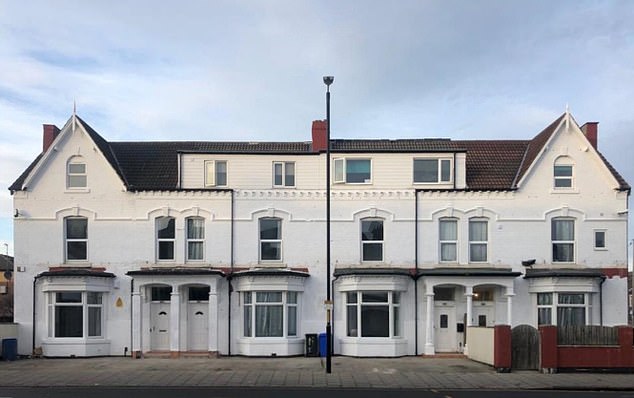
In Middlesbrough this huge 27-bed HMO property is being used to house a number of asylum seekers as part of the government’s ‘Operation Scatter’ scheme
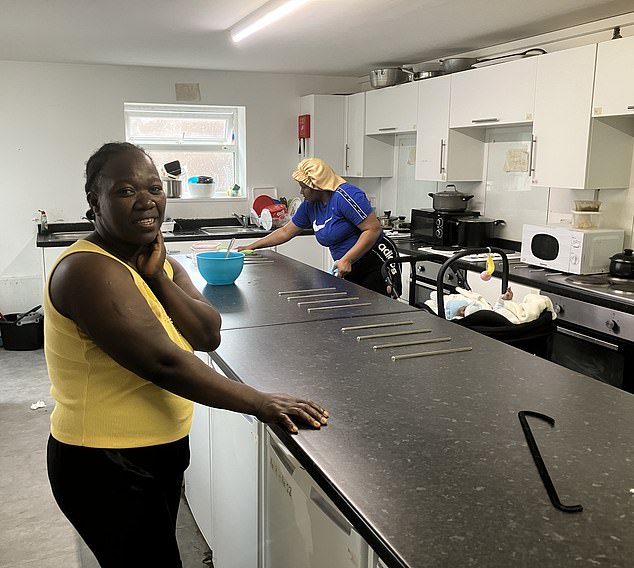
Zainab Turay was originally from Sierra Leone Zainab was a weightlifting coach at the 2022 Commonwealth Games in Birmingham – but instead of returning home claimed asylum here
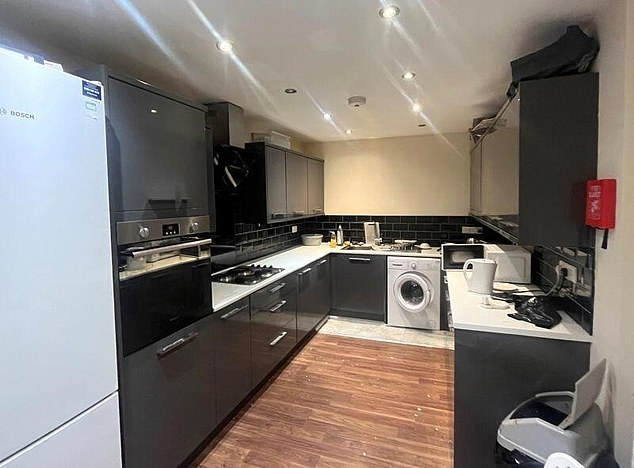
One of the kitchens inside the giant HMO which features an oven and fridge freezer
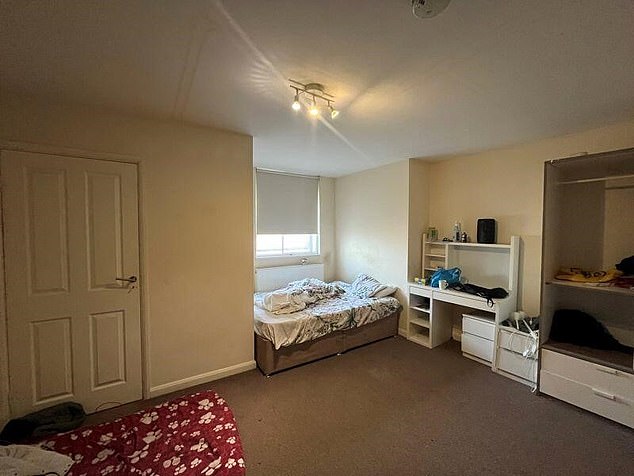
A bedroom inside the Mears-run HMO, which features a large wardrobe, desk and double bed
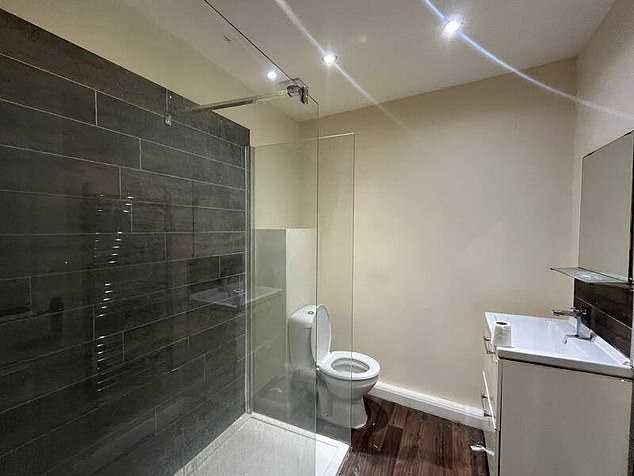
One of the bathrooms inside the huge HMO property boasts a large modern walk in shower
A few miles away, a Union Jack flies by the next door house to Sudanese asylum seeker Ahmed Mohammed.
‘I came here to the UK eight months ago,’ the 20 year old said. ‘First to Manchester and then to Burnley. I like it in the UK – it is safe not like Sudan.
‘I have no problems here. People are nice. I live with three other men here from Ethiopia and Eritrea.’
Burnley Council have said there are no asylum seekers being housed in hotels in the town.
The council said 118 houses are being used for asylum seekers, Middlesbrough has also become one of Britain’s biggest migrant dumping grounds.
According to the figures, 681 are now housed in the town – at a rate of 44 per 10,000 people.
One of them, Zainab Turay, 31, lives in a huge 27-bed HMO. Originally from Sierra Leone Zainab was a weightlifting coach for her country at the 2022 Commonwealth Games in Birmingham – but instead of returning home with the team instead claimed asylum here.
She claims that she did this because if she returned to Sierra Leone she would have been ordered to carry out gruesome female genital mutilation on children so instead decided to stay in the UK, even though this would mean leaving behind her own child.
But her claim for asylum was rejected by the Home Office. She has since had another child and is now waiting for an appeal hearing.
The mother-of-two now lives in a cramped bedroom in the 9,000 sq ft complex with her 11-month-old baby. Toilets and showers are shared with dozens of strangers, while meals are cooked shoulder-to-shoulder in a tired-looking kitchen.
Zainab is among female asylum seekers and their children living in the colossal complex. Her terraced property was bought for £59,000 five years ago along with three neighbouring terraced homes, which have been knocked through and extended into a giant HMO which is leased to Mears Group.
Once contracts are signed with government providers, landlords are guaranteed rent, whether rooms are filled or not, and do not have to pay utilities bills.
One estate agent listing of HMO properties boasts of ‘guaranteed rent’ for five years.
When a Mears-run HMO in Middlesbrough was put up for sale, an estate agency listing crowed: ‘The property is leased to Mears (who provide housing to Asylum Seekers, Sheltered Accommodation, Relocation etc) on a five year lease with guaranteed income.
‘This means that Mears are your tenant, not the sub-let tenants, so reliable monthly income without the hassle, so sit back, relax and enjoy.’
Neighbours living near the property spoke of their concerns. Local residents Donna Marie, 54, said: ‘They are all young men, they’re in and out all night. It’s intimidating. My daughter is 13 and feels too scared to leave the house in the evening.
‘The noise never stops, cooking in the middle of the night, banging knives, shouting. It’s like living next to a hostel.
‘We’ve seen them selling things on the doorstep – laptops, PlayStations, new shoes – people pull up, hand over money and get the goods.
‘We told Mears what was happening, but they weren’t interested.
‘It just annoys me because there are so many local people in need of proper housing and they can’t get help.
‘My son is 30 and he’s homeless. He went to council and they said he wasn’t a priority.
‘We’ve taken him in to live with us. I couldn’t leave him on the streets.’
More than one in 30 of all asylum seekers in the UK now live in the North East. South Tyneside has 586 (39 per 10,000 people) living in HMO’s with none in hotels.
The region was home to 27.6 asylum seekers per 10,000 people as of March, compared with just 7.2 per 10,000 in the South West.
One HMO in Stockton-on-Tees – whose local MP told parliament in June how the town had ‘amongst the highest levels of asylum seekers per population in the entire country’ – brings its owners rental income of £42,120 per year.
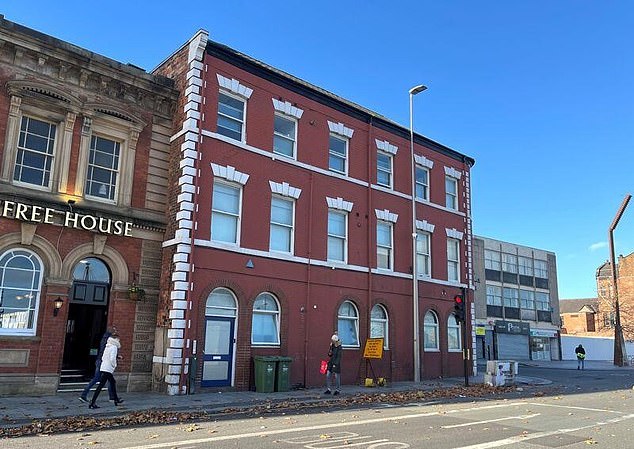
A set of five flats used by Mears to house asylum seekers in Stockton, near Middlesbrough, bringing its owners rental income of £42,120 per year

Vivekanantham Pavyananthy, 35, and her daughter, three, live in one of five flats. She sought asylum with her husband after flying from Sri Lanka 18 months ago
Vivekanantham Pavyananthy, 35, and daughter, three, live in one of five flats used by Mears to house asylum seekers there.
She sought asylum with her husband after flying from Sri Lanka 18 months ago.
Ms Pavyananthy was rehoused in the apartment block eight months ago after the family were placed in a migrant hotel in Wakefield, West Yorks, and is awaiting to learn her family’s fate.
She said: ‘We have had our interview but we are still waiting for their decision. Maybe in one or two months we will hear. We are confident. There are issues which mean we cannot go home.’
On the floor above, another asylum seeker from Somalia told how he arrived on a small boat from France in 2021 with his wife, who has had two children while they have been awaiting their asylum decision.
Another nearby Mears-run migrant home is on a suburban road where Union and St George flags hang from windows of other properties.
In a Suffolk village four townhouses for migrants have been bought by the local council for £300,000 each and include ensuite bathrooms, underfloor heating and electric vehicle charging points.
In Luton, another migrant hotspot, around 450 migrants are living in a former halls of residence that were built as accommodation for first year students attending the University of Luton.
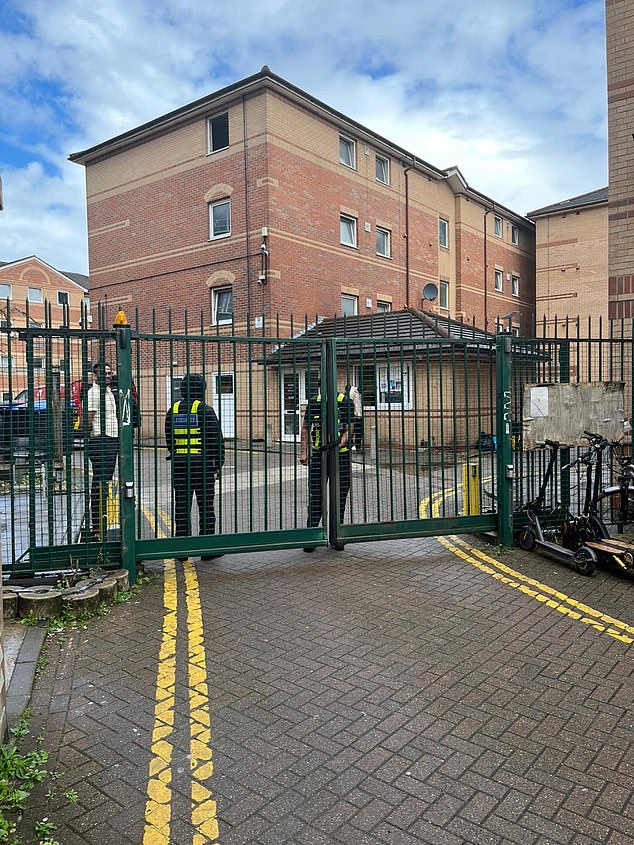
In Luton a former halls of residence at the university now houses 450 migrants
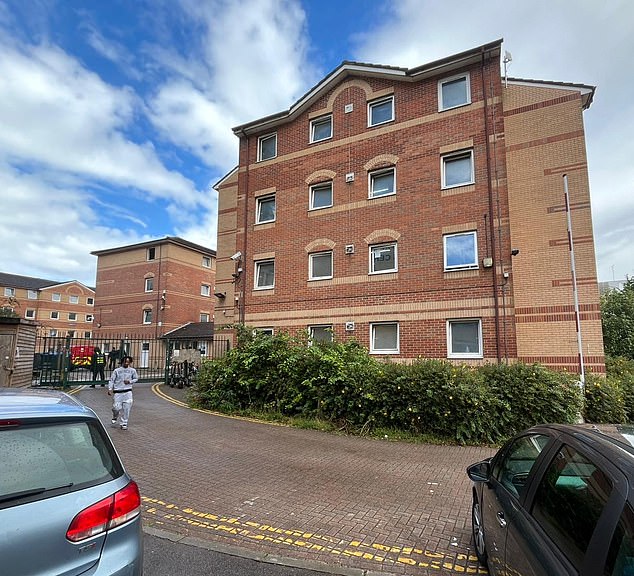
The two-acre student village was built for first year students attending the university
Last March, the owner of the two-acre student village – Luton Halls Properties Limited – submitted full plans for the conversion and change of use to co-living accommodation, with the demolition of the warden’s bungalow.
The 10 four-storey blocks on the site – which is next to the town’s rail station – have been set aside for single men.Each floor has six en-suite bedrooms and a communal kitchen area while security guards man the front electric gates and CCTV cameras have been installed at every entry point.
Aram Assad has been living there for the last five months after leaving his home in Erbil in Iraq.
He says he is given £48-a-week by the Government to spend on food. Aram – who travelled to Dubai and Africa before making his way through Europe – said: ‘I didn’t want to stay in Germany or France, I don’t speak their language and the people there saw me as a problem.
‘Here in England everything is good, I can speak a little bit of English and so people understand me when I go to the shops.
‘In Iraq I had many jobs, as an electrician, as a mechanic. I want to stay here and work, plus my wife and son are already in England.’
Paul Smith, 38, who works close to the asylum blocks, said: ‘I don’t think it’s ideal having so many people in one place fenced away from everyone else.
‘The police are there quite regularly. They were called a few weeks ago to deal with a man who had come out into the street and was behaving aggressively.
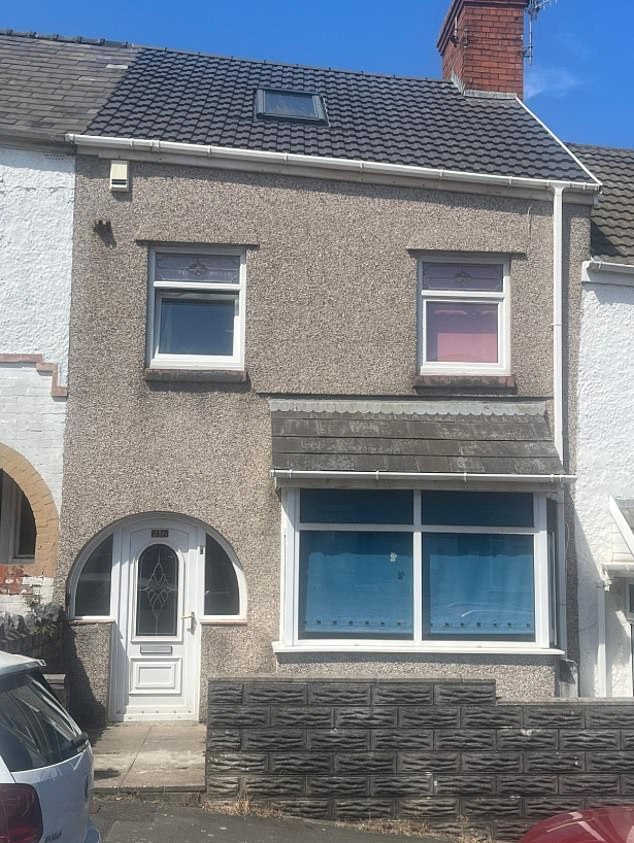
In Swansea where 717 asylum seekers live Clearsprings boss Graham King owns at least 16 properties. Swansea was the second place in the UK to receive City of Sanctuary status
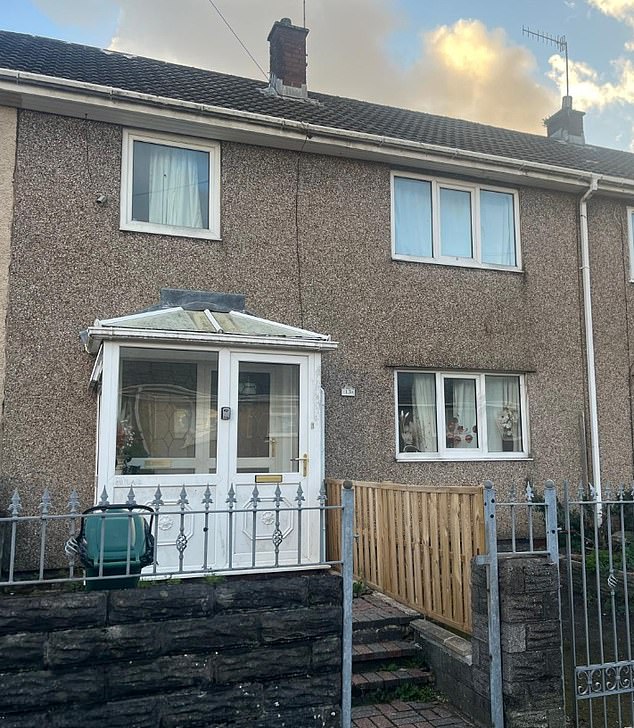
King snapped up the Coronation Street-style homes which he bought for as little as £27,500
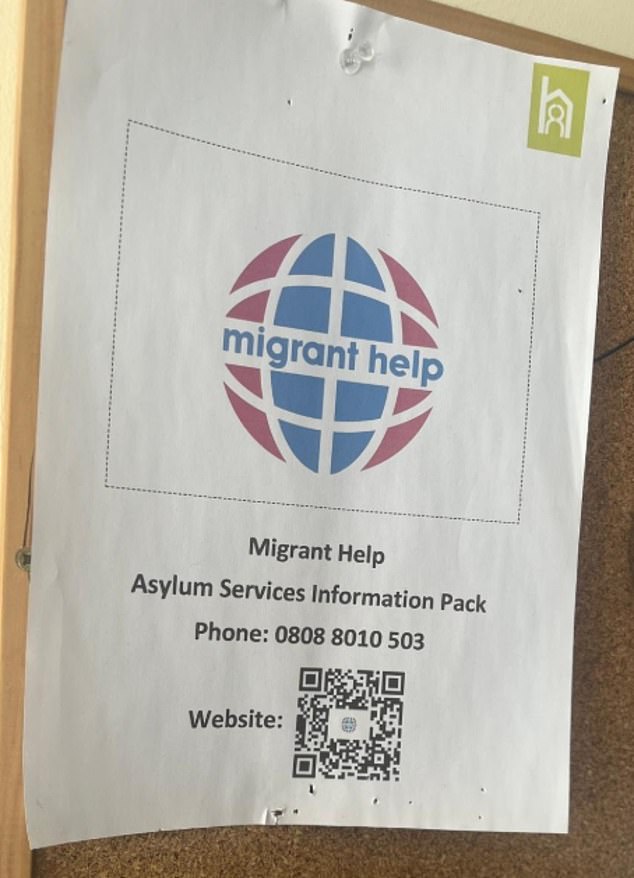
A notice on a cork board in one of the homes includes a QR code to help migrants access an Asylum Services Information Pack
‘The officers were having to restrain him on the ground and were with him for quite a while trying to calm him down. Why he was like that, I don’t know.
‘I’m not sure how well the residents mix with locals in the town. But I know the Hat Factory Arts Centre, which is next door, holds coffee meetings every Thursday afternoon for asylum seekers who are part of the LGBT+ community and haven’t come out properly yet due to coming from countries where being gay is not accepted.’
Another local, who asked not to be named, said: ‘The police can be there up to five times a day. There’s always ambulances going in as well.
‘There are men from different parts of the world living there and when they argue it can turn really nasty.
‘One afternoon last month we heard shouting and the words ‘police! Get down…now’.
‘I went had a look at what was going on in the street outside and armed police were pointing guns at a man on the floor. The officers later arrested his mate who had apparently threatened to stab someone.’ Both of them came from the old student halls.
Meanwhile it’s been revealed the Clearsprings boss King dubbed ‘the asylum king’ has a lucrative spin-off property empire made up of Coronation Street-style homes which he snapped up for as little £27,500.
In Swansea where there are 717 asylum seekers not living in hotels, King owns at least 16 properties which he bought for a total of £1,428,450.
Tenants are looked after by the UK-based national charity Migrant Help who assist asylum seekers to settle in Swansea – the second place in the UK to receive City of Sanctuary status.
One property in Ramsey Street, which is now empty, is said to have become a depository for a stream of young men, some who arrived illegally by boat – and didn’t make good neighbours.
One resident of the quiet street of neat bungalows and modern link houses said: ‘The police and Border Force were back and forth the whole time the house was occupied.
‘It looked to me like some were placed here by Swansea Council but they brought in friends who were here illegally.’
The resident, a 48-year-old carer, said that, at times, there were up to six young men staying at the three bedroomed property who would pass the day drinking and smoking cannabis.
Police were regular visitors, and one neighbour had to call 999 after seeing one of the young men checking cars parked in their driveway for valuables at dusk.

Clearsprings boss Graham King has amassed a £1.015 billion fortune during the migrant crisis
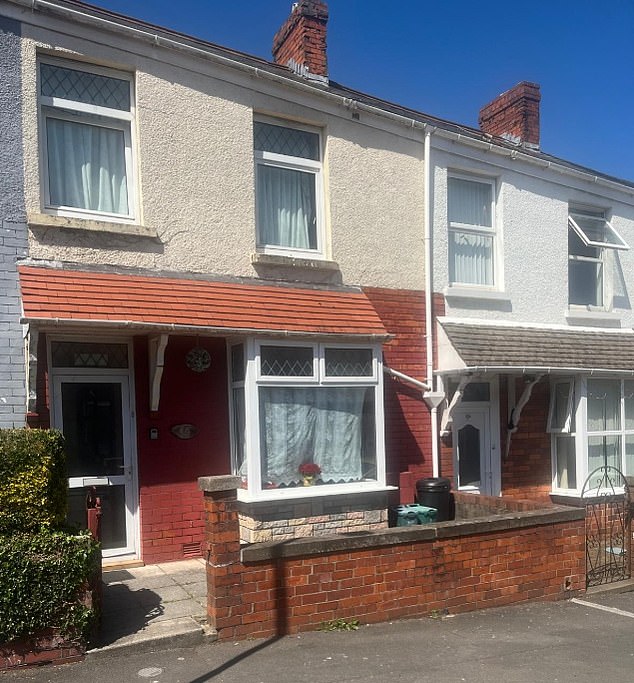
King owns at least 16 properties in Swansea, including the one pictured above, which he bought for a total of £1,428,450
The neighbour fears Ramsey Street will be replicated across the country if the Government starts putting asylum seekers in residential housing instead of hotels.
The local council has spent months lobbying the Home Office to drop its policy saying HMOs are ‘wholly unsuitable forms of accommodation for asylum seekers’ while their use risked ‘inflaming strain, conflict and division’.
Labour council leader Gavin Callaghan said: ‘Working class Basildon families have been evicted from their family homes, streets have been destabilised, and ordinary people in this borough, who never asked for wars in faraway lands, have found themselves losing homes to an asylum system that is broken and unfair.’
Hotels and houses of multiple occupancy are simply the wrong places to house people – we all know it.’












